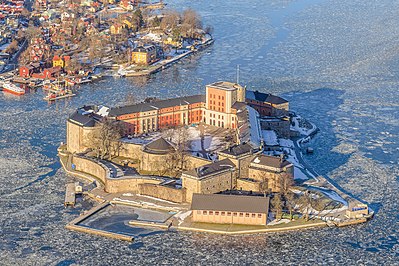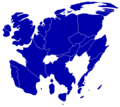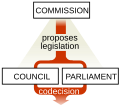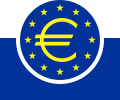Portal:European Union
Introduction
The European Union (EU) is a supranational political and economic union of 27 member states that are located primarily in Europe. The Union has a total area of 4,233,255 km2 (1,634,469 sq mi) and an estimated total population of over 449 million. The EU has often been described as a sui generis political entity combining the characteristics of both a federation and a confederation. Containing 5.8% of the world population in 2020, EU member states generated a nominal gross domestic product (GDP) of around US$16.6 trillion in 2022, constituting approximately one sixth of global nominal GDP. Additionally, all EU states except Bulgaria have a very high Human Development Index according to the United Nations Development Programme. Its cornerstone, the Customs Union, paved the way to establishing an internal single market based on standardised legal framework and legislation that applies in all member states in those matters, and only those matters, where the states have agreed to act as one. EU policies aim to ensure the free movement of people, goods, services and capital within the internal market; enact legislation in justice and home affairs; and maintain common policies on trade, agriculture, fisheries and regional development. Passport controls have been abolished for travel within the Schengen Area. The eurozone is a group composed of the 20 EU member states that have fully implemented the economic and monetary union and use the euro currency. Through the Common Foreign and Security Policy, the union has developed a role in external relations and defence. It maintains permanent diplomatic missions throughout the world and represents itself at the United Nations, the World Trade Organization, the G7 and the G20. Due to its global influence, the European Union has been described by some scholars as an emerging superpower. In 2012, the EU was awarded the Nobel Peace Prize. The United Kingdom became the only member state to leave the EU, in 2020; ten countries are aspiring or negotiating to join it. (Full article...) Selected article The Kingdom of Belgium is a country in northwest Europe bordered by the Netherlands, Germany, Luxembourg and France and is one of the founding and core members of the European Union. Belgium has a population of over ten million people, in an area of around 30,000 square kilometres (11,700 square miles). Straddling the cultural boundary between Germanic and Romance Europe, Belgium is linguistically divided. It has two main languages: 59% of its population, mainly in the region Flanders, speak Dutch; French is spoken by 40% of the entire Belgian population. Less than 1% of the Belgian people, around 70,000 citizens, live in the German-speaking Community in the east of Wallonia. This linguistic diversity often leads to political and cultural conflict and is reflected in Belgium's complex system of government and political history. Belgium derives its name from the Latin name of the most northern part of Gaul, Gallia Belgica, named after a group of mostly Celtic tribes, Belgae. Historically, Belgium has been a part of the Low Countries, which also include the Netherlands and Luxembourg and used to cover a somewhat larger region than the current Benelux group of states. From the end of the Middle Ages until the seventeenth century, it was a prosperous centre of commerce and culture. From the sixteenth century until the Belgian revolution in 1830, the area at that time called the Southern Netherlands, was the site of many battles between the European powers. More recently, Belgium was a founding member of the European Union, hosting its headquarters, as well as those of many other major international organisations, such as NATO. Selected picturePhotograph credit: Arild Vågen Vaxholm Fortress is a historic fortification on the island of Vaxholmen in the Stockholm archipelago just east of the Swedish town of Vaxholm. The first structure, a wooden blockhouse, was constructed by King Gustav I in 1548 as a defensive structure and customs post at this strategic site on the sea approach to Stockholm. It was replaced by a round stone tower during John III's reign. The present buildings date to 1833; their design was inspired by ideas on fortifications propounded by French engineers the marquis de Montalembert and Lazare Carnot. The fortress has been listed as a state monument since 1935 and now houses the Vaxholm Fortress Museum.
Did you know?...that "Nocturne" is the Eurovision Song Contest winner with the fewest words, the Norwegian language original having only 25?  ...that the Eastgate Clock (pictured) in Chester is the second most photographed timepiece in the United Kingdom, after Big Ben? ...that "Kinek mondjam el vétkeimet?" received three perfect scores at the start of voting in the Eurovision Song Contest 1994 before ultimately coming in fourth, making Hungary the only debuting nation to lead the voting? Selected cityAthens is the capital and largest city of Greece. Named after goddess Athena, Athens is a cosmopolitan metropolis with a population of 3.7 million people. The Athens metropolitan area constitutes the center of economic, financial, industrial, cultural and political life in Greece. The city is also rapidly becoming a business center in the European Union. Ancient Athens was a powerful polis city-state and a renowned center of learning, home of Plato's Academy and Aristotle's Lyceum. It is often referred to as the cradle of Western civilization, largely due to the impact of its cultural and political achievements during the 5th and 4th centuries BCE on the rest of the then known European Continent. The classical era heritage is still evident in the city, portrayed through a number of ancient monuments and artworks, the most famous being the Parthenon on the Acropolis. Athens was the host city of the first modern-day Olympic Games and, more recently, of the 2004 Summer Olympics. General imagesThe following are images from various European Union-related articles on Wikipedia.
TopicsFeatured contentFeatured articles
Featured lists
Featured contentGood articles
CategoriesRelated portalsAssociated WikimediaThe following Wikimedia Foundation sister projects provide more on this subject:
Discover Wikipedia using portals |
































































